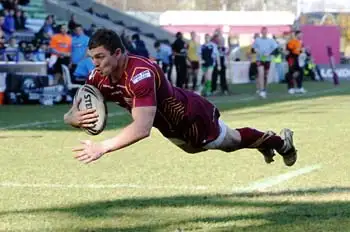Stop the international merry-go-round

One of the issues that has dogged international rugby league, especially in recent seasons, is that of players swapping international allegiance and choosing to represent another country. In 2013 – a World Cup year – it looks as though that problem is going to be as prevalent as ever. A number of players are going to be selected for this year’s World Cup who have previously represented another country.
Unlike many people, I don’t have a problem with players choosing to represent a country other than that of their birth. This is something that happens in all sports – for example the Somalian-born Mo Farah winning Gold for Great Britain and Ireland at London 2012. Players can legitimately feel a deeper connection to the country of their parents/grandparents or the country they have moved to, and that should be allowed for.
The problems begin, in my opinion, when having played for one country a player then changes his mind and chooses to play for another.
Yet this is the situation that rugby league finds itself in. Danny Brough and Ian Henderson, having played for Scotland in the 2008 World Cup, made themselves available for England in the hope of playing in a better international team. Jarryd Hayne is available for selection by Australia, but if he isn’t selected for the Kangaroos he will represent Fiji instead. Anthony Laffranchi has done the reverse – having played for Australia in 2008 but no longer being considered for the Australian squad, he has opted instead to represent Italy.
I have no problem with Hayne or Laffranchi – both New South Welshmen – choosing to represent Fiji or Italy instead of Australia. That’s their heritage, and they’re rightly proud of it. But the problem is that both had already made the decision to play for Australia, only to change their minds when it became beneficial to do so.
That said, while swapping allegiance once may be disagreeable, it doesn’t do immense harm. Yet it leaves the door open for constant swapping and switching that does real damage to the credibility of international rugby league.
Take Danny Brough for example. He chose to represent Scotland in 2004 and captained the Scots at the 2008 World Cup in Australia. Realising, presumably, that he might be good enough to play for England, Brough made himself available for England selection in 2009. He wasn’t picked however, and played again for Scotland in the 2010 European Cup. He was then selected in the England squad for the 2011 Four Nations (even though this appeared to be against RLIF rules – see here). There is now talk of a return to Scotland for this year’s World Cup.
If that isn’t proof enough of how daft the situation can become, look at how brazenly the players now speak of changing from country to another. Keith Mason played for Wales against England in 2001 and against New Zealand in 2002. He then made the switch to England ‘A’ in order to boost his prospects of playing for Great Britain. Now Mason says he would consider going back to Wales for the World Cup: “I’ve said before that Wales is my second choice with England first, so we’ll see”.
It’s hard, because the addition of Laffranchi in the Italy team, Hayne in the Fiji team and Brough in the Scotland team gives these countries a better chance of performing respectably in the World Cup. Yet this benefit is nullified by the ridiculous way that players can swap international allegiance at will, can make themselves available for two or more nations at the same time, and can simply ignore what scant RLIF regulations do exist.
Something needs to be done about the situation. Whether that simply means sterner RLIF laws that the various countries are actually required to follow or a total ban on players changing which country they represent is a matter for discussion. But the credibility of international rugby league depends on some solution being found.
Keep Your Eye on Rugby League
Twitter: @Tony_Williams88